阅读
阅读的意思解释

阅读的意思解释阅读是指以文字或其他文本形式获取信息的过程,它通常需要读者仔细阅读、理解和提取信息。
许多专家认为,阅读是学习的基础,其他形式的学习都是建立在阅读之上的。
人们通过阅读来拓宽视野,增长知识,了解别人的想法和思想,并学习新的技能。
什么是阅读?简单地说,阅读是从书籍、报纸、杂志等文字材料中获取信息的过程。
阅读不仅涉及到视觉和听觉,而且涉及到认知和情感。
它也是一种能力,即阅读理解能力,也是一种技能,即阅读技巧。
一般来说,人们在阅读时,会通过目录、文章开头、文章末尾、标题提示以及前文、文中和后文之间的关系等方式,抓取文本的宏观架构和文本信息,从而了解全文的大意。
显然,有效的阅读过程需要受到一定的训练才能达到高效的阅读水平。
在更宏观的层面上来说,读者应灵活运用各种策略,以帮助提高阅读速度、提高理解力、分析问题和提取重要信息。
首先,读者应当具备良好的预读能力,即读前预习。
预读是一种有效的阅读策略,可以帮助读者对文本进行快速浏览,了解文本的大概内容,以便为之做准备。
预读能力也有助于建立文本内部的逻辑关系,即文章的结构与意义之间的联系。
继而,读者应熟练掌握聚焦阅读技巧,即精读能力。
聚焦阅读有助于学生将注意力集中在文本的核心信息上,而不是每一句话都能理解、每一个细节都能记住。
在聚焦阅读过程中,学生可以针对文章的主要观点、图表数据、示例以及词汇和表达式,快速有效地提高自己的理解能力。
此外,读者还应该学习有效地综合信息。
综合信息有助于学生在阅读过程中发现有关文本的关联性,并以此来准确理解文本的内容。
在阅读文本时,读者应该努力建立相应的联系,以及文中提到的内容和论述细节,并将文本中的信息进行归纳、抽象和综合,构建有序的文本架构。
最后,读者应该学会拓展阅读,即用看完文本后思考的能力来拓展读者的知识面和思维技能。
拓展阅读意味着读者要运用自己的理解,重新思考文本的内容和思想,引发不同的论述和思考,以扩展自己的视野。
阅读到底有什么意义
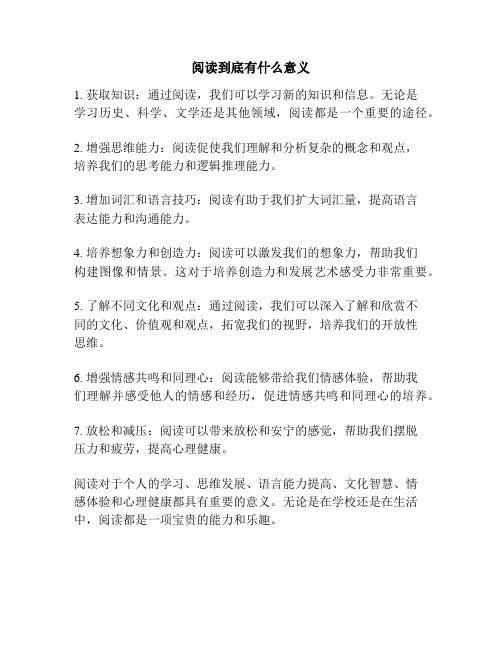
阅读到底有什么意义
1. 获取知识:通过阅读,我们可以学习新的知识和信息。
无论是
学习历史、科学、文学还是其他领域,阅读都是一个重要的途径。
2. 增强思维能力:阅读促使我们理解和分析复杂的概念和观点,
培养我们的思考能力和逻辑推理能力。
3. 增加词汇和语言技巧:阅读有助于我们扩大词汇量,提高语言
表达能力和沟通能力。
4. 培养想象力和创造力:阅读可以激发我们的想象力,帮助我们
构建图像和情景。
这对于培养创造力和发展艺术感受力非常重要。
5. 了解不同文化和观点:通过阅读,我们可以深入了解和欣赏不
同的文化、价值观和观点,拓宽我们的视野,培养我们的开放性
思维。
6. 增强情感共鸣和同理心:阅读能够带给我们情感体验,帮助我
们理解并感受他人的情感和经历,促进情感共鸣和同理心的培养。
7. 放松和减压:阅读可以带来放松和安宁的感觉,帮助我们摆脱
压力和疲劳,提高心理健康。
阅读对于个人的学习、思维发展、语言能力提高、文化智慧、情
感体验和心理健康都具有重要的意义。
无论是在学校还是在生活中,阅读都是一项宝贵的能力和乐趣。
常用的阅读方法七种
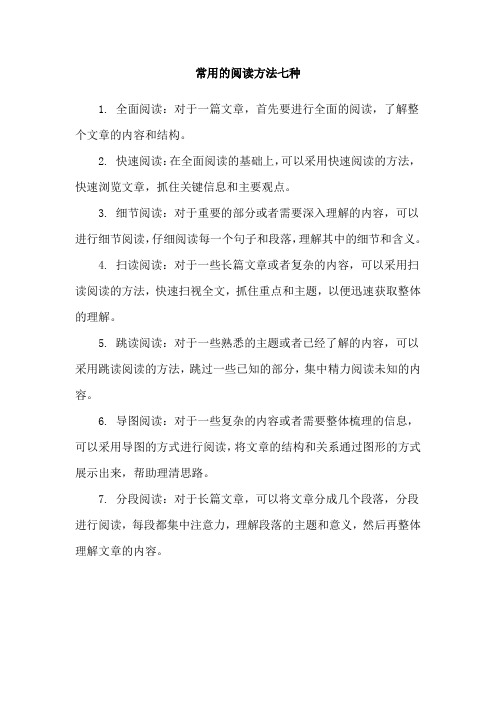
常用的阅读方法七种
1. 全面阅读:对于一篇文章,首先要进行全面的阅读,了解整个文章的内容和结构。
2. 快速阅读:在全面阅读的基础上,可以采用快速阅读的方法,快速浏览文章,抓住关键信息和主要观点。
3. 细节阅读:对于重要的部分或者需要深入理解的内容,可以进行细节阅读,仔细阅读每一个句子和段落,理解其中的细节和含义。
4. 扫读阅读:对于一些长篇文章或者复杂的内容,可以采用扫读阅读的方法,快速扫视全文,抓住重点和主题,以便迅速获取整体的理解。
5. 跳读阅读:对于一些熟悉的主题或者已经了解的内容,可以采用跳读阅读的方法,跳过一些已知的部分,集中精力阅读未知的内容。
6. 导图阅读:对于一些复杂的内容或者需要整体梳理的信息,可以采用导图的方式进行阅读,将文章的结构和关系通过图形的方式展示出来,帮助理清思路。
7. 分段阅读:对于长篇文章,可以将文章分成几个段落,分段进行阅读,每段都集中注意力,理解段落的主题和意义,然后再整体理解文章的内容。
经典阅读30篇
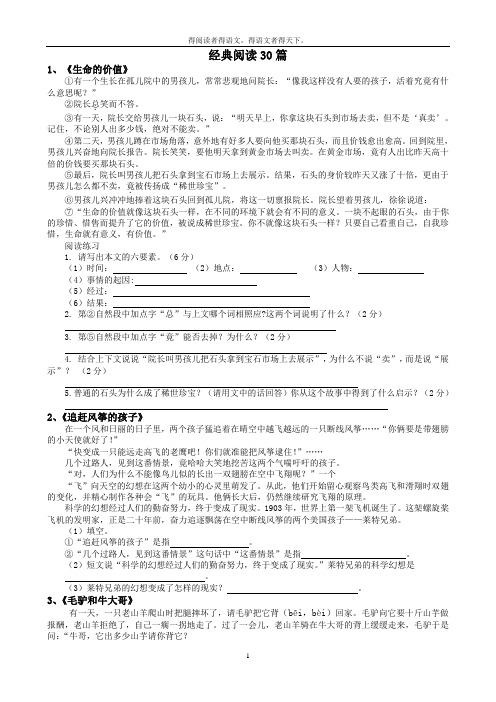
经典阅读30篇1、《生命的价值》①有一个生长在孤儿院中的男孩儿,常常悲观地问院长:“像我这样没有人要的孩子,活着究竟有什么意思呢?”②院长总.笑而不答。
③有一天,院长交给男孩儿一块石头,说:“明天早上,你拿这块石头到市场去卖,但不是‘真卖’。
记住,不论别人出多少钱,绝对不能卖。
”④第二天,男孩儿蹲在市场角落,意外地有好多人要向他买那块石头,而且价钱愈出愈高。
回到院里,男孩儿兴奋地向院长报告。
院长笑笑,要他明天拿到黄金市场去叫卖。
在黄金市场,竟有人出比昨天高十倍的价钱要买那块石头。
⑤最后,院长叫男孩儿把石头拿到宝石市场上去展示。
结果,石头的身价较昨天又涨了十倍,更由于男孩儿怎么都不卖,竟.被传扬成“稀世珍宝”。
⑥男孩儿兴冲冲地捧着这块石头回到孤儿院,将这一切禀报院长。
院长望着男孩儿,徐徐说道:⑦“生命的价值就像这块石头一样,在不同的环境下就会有不同的意义。
一块不起眼的石头,由于你的珍惜、惜售而提升了它的价值,被说成稀世珍宝。
你不就像这块石头一样?只要自己看重自己,自我珍惜,生命就有意义,有价值。
”阅读练习1. 请写出本文的六要素。
(6分)(1)时间:(2)地点:(3)人物:(4)事情的起因:(5)经过:(6)结果:2. 第②自然段中加点字“总”与上文哪个词相照应?这两个词说明了什么?(2分)3. 第⑤自然段中加点字“竟”能否去掉?为什么?(2分)4. 结合上下文说说“院长叫男孩儿把石头拿到宝石市场上去展示”,为什么不说“卖”,而是说“展示”?(2分)5.普通的石头为什么成了稀世珍宝?(请用文中的话回答)你从这个故事中得到了什么启示?(2分)2、《追赶风筝的孩子》在一个风和日丽的日子里,两个孩子猛追着在晴空中越飞越远的一只断线风筝……“你俩要是带翅膀的小天使就好了!”“快变成一只能远走高飞的老鹰吧!你们就准能把风筝逮住!”……几个过路人,见到这番情景,竟哈哈大笑地挖苦这两个气喘吁吁的孩子。
“对,人们为什么不能像鸟儿似的长出一双翅膀在空中飞翔呢?”一个“飞”向天空的幻想在这两个幼小的心灵里萌发了。
阅读的好处10条简短
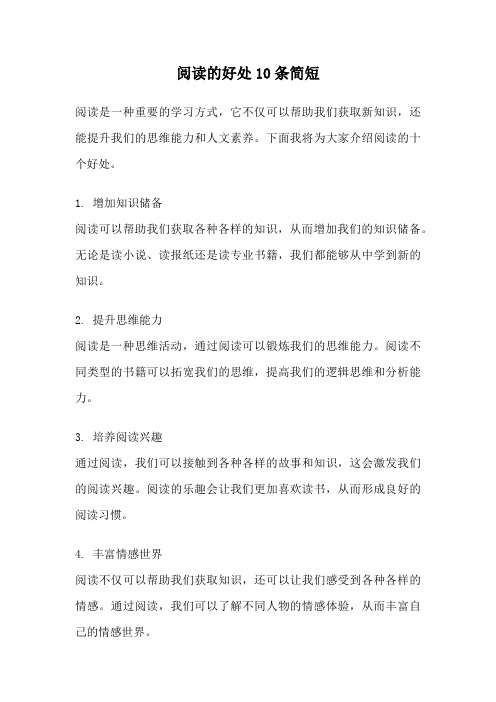
阅读的好处10条简短阅读是一种重要的学习方式,它不仅可以帮助我们获取新知识,还能提升我们的思维能力和人文素养。
下面我将为大家介绍阅读的十个好处。
1. 增加知识储备阅读可以帮助我们获取各种各样的知识,从而增加我们的知识储备。
无论是读小说、读报纸还是读专业书籍,我们都能够从中学到新的知识。
2. 提升思维能力阅读是一种思维活动,通过阅读可以锻炼我们的思维能力。
阅读不同类型的书籍可以拓宽我们的思维,提高我们的逻辑思维和分析能力。
3. 培养阅读兴趣通过阅读,我们可以接触到各种各样的故事和知识,这会激发我们的阅读兴趣。
阅读的乐趣会让我们更加喜欢读书,从而形成良好的阅读习惯。
4. 丰富情感世界阅读不仅可以帮助我们获取知识,还可以让我们感受到各种各样的情感。
通过阅读,我们可以了解不同人物的情感体验,从而丰富自己的情感世界。
5. 提高写作能力通过阅读优秀的文章,我们可以学到写作的技巧和方法。
阅读可以帮助我们提高写作能力,让我们的表达更加准确清晰,逻辑更加严密。
6. 培养良好的价值观阅读可以帮助我们了解和思考各种不同的价值观。
通过阅读,我们可以认识到不同人的不同看法,从而形成自己的独立思考能力,培养良好的价值观。
7. 放松心情阅读是一种放松心情的方式。
在繁忙的生活中,阅读可以帮助我们放松身心,舒缓压力,使我们的心情变得更加愉快。
8. 培养想象力阅读可以培养我们的想象力。
通过阅读,我们可以想象出书中的情节和人物形象,让我们的想象力得到锻炼和提高。
9. 提升人文素养阅读不仅可以帮助我们获取知识,还可以提升我们的人文素养。
通过阅读文学作品,我们可以了解不同文化的特点和人文精神,从而提升自己的人文素养。
10. 增加社交话题通过阅读,我们可以了解到各种各样的知识和故事,这些都可以成为我们与他人交流的话题。
阅读可以帮助我们拓宽社交圈子,与他人进行有意义的交流。
阅读是一种非常重要的学习方式,它可以帮助我们增加知识储备,提升思维能力,培养阅读兴趣,丰富情感世界,提高写作能力,培养良好的价值观,放松心情,培养想象力,提升人文素养,增加社交话题。
常见的八种读书方法

常见的八种读书方法
1. 主动阅读。
主动阅读是指读者在阅读过程中积极思考、提出问题、寻找答案、做笔记等。
这种方法可以帮助读者更好地理解和吸收所阅读的内容。
2. 多角度阅读。
多角度阅读是指读者在阅读一本书时,从不同的角度和视角去理解和分析书中的内容,以便更全面地掌握书中的知识和思想。
3. 速读。
速读是指以较快的速度阅读一本书,目的是快速获取书中的主要信息和观点。
这种方法适合于需要快速了解某一主题或内容的读者。
4. 细读。
细读是指深入、细致地阅读一本书,目的是全面理解书中的内容和思想。
这种方法适合于需要深入研究和理解某一主题或内容的读者。
5. 主题阅读。
主题阅读是指选择一个特定的主题或话题,然后选择相关的书籍进行阅读,以便更全面地了解和掌握这一主题或话题。
6. 背诵。
背诵是指通过反复朗读和记忆书中的内容,以便更深刻地理解和掌握书中的知识和思想。
7. 讨论。
讨论是指与他人一起阅读并讨论书中的内容和观点,以便从不同的角度和视角去理解和分析书中的内容。
8. 应用。
应用是指将书中的知识和思想应用到实际生活中,以便更好地
理解和掌握书中的内容,并将其转化为自己的能力和素养。
这些常见的读书方法可以帮助读者更好地理解和掌握所阅读的内容,提高阅读效率和质量,同时也能够拓展读者的知识视野和思维深度。
希望读者在阅读时能够灵活运用这些方法,不断提升自己的阅读能力和水平。
“阅读”和“悦读”
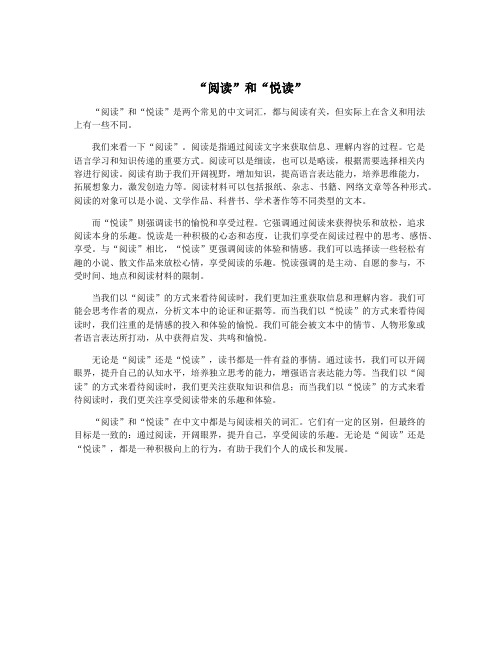
“阅读”和“悦读”“阅读”和“悦读”是两个常见的中文词汇,都与阅读有关,但实际上在含义和用法上有一些不同。
我们来看一下“阅读”。
阅读是指通过阅读文字来获取信息、理解内容的过程。
它是语言学习和知识传递的重要方式。
阅读可以是细读,也可以是略读,根据需要选择相关内容进行阅读。
阅读有助于我们开阔视野,增加知识,提高语言表达能力,培养思维能力,拓展想象力,激发创造力等。
阅读材料可以包括报纸、杂志、书籍、网络文章等各种形式。
阅读的对象可以是小说、文学作品、科普书、学术著作等不同类型的文本。
而“悦读”则强调读书的愉悦和享受过程。
它强调通过阅读来获得快乐和放松,追求阅读本身的乐趣。
悦读是一种积极的心态和态度,让我们享受在阅读过程中的思考、感悟、享受。
与“阅读”相比,“悦读”更强调阅读的体验和情感。
我们可以选择读一些轻松有趣的小说、散文作品来放松心情,享受阅读的乐趣。
悦读强调的是主动、自愿的参与,不受时间、地点和阅读材料的限制。
当我们以“阅读”的方式来看待阅读时,我们更加注重获取信息和理解内容。
我们可能会思考作者的观点,分析文本中的论证和证据等。
而当我们以“悦读”的方式来看待阅读时,我们注重的是情感的投入和体验的愉悦。
我们可能会被文本中的情节、人物形象或者语言表达所打动,从中获得启发、共鸣和愉悦。
无论是“阅读”还是“悦读”,读书都是一件有益的事情。
通过读书,我们可以开阔眼界,提升自己的认知水平,培养独立思考的能力,增强语言表达能力等。
当我们以“阅读”的方式来看待阅读时,我们更关注获取知识和信息;而当我们以“悦读”的方式来看待阅读时,我们更关注享受阅读带来的乐趣和体验。
“阅读”和“悦读”在中文中都是与阅读相关的词汇。
它们有一定的区别,但最终的目标是一致的:通过阅读,开阔眼界,提升自己,享受阅读的乐趣。
无论是“阅读”还是“悦读”,都是一种积极向上的行为,有助于我们个人的成长和发展。
阅读的重要性是什么?
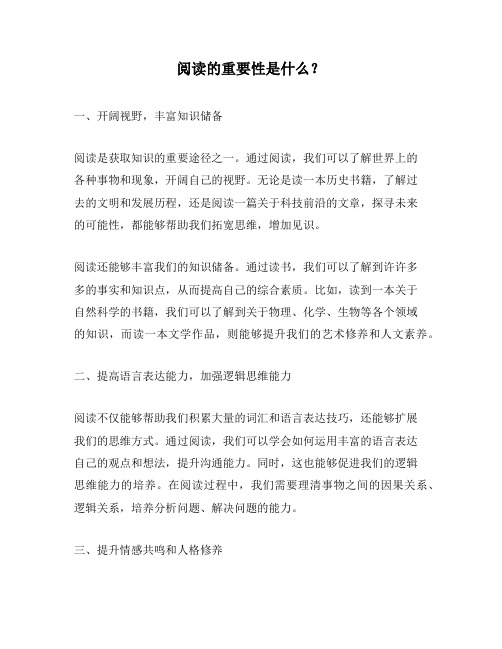
阅读的重要性是什么?一、开阔视野,丰富知识储备阅读是获取知识的重要途径之一。
通过阅读,我们可以了解世界上的各种事物和现象,开阔自己的视野。
无论是读一本历史书籍,了解过去的文明和发展历程,还是阅读一篇关于科技前沿的文章,探寻未来的可能性,都能够帮助我们拓宽思维,增加见识。
阅读还能够丰富我们的知识储备。
通过读书,我们可以了解到许许多多的事实和知识点,从而提高自己的综合素质。
比如,读到一本关于自然科学的书籍,我们可以了解到关于物理、化学、生物等各个领域的知识,而读一本文学作品,则能够提升我们的艺术修养和人文素养。
二、提高语言表达能力,加强逻辑思维能力阅读不仅能够帮助我们积累大量的词汇和语言表达技巧,还能够扩展我们的思维方式。
通过阅读,我们可以学会如何运用丰富的语言表达自己的观点和想法,提升沟通能力。
同时,这也能够促进我们的逻辑思维能力的培养。
在阅读过程中,我们需要理清事物之间的因果关系、逻辑关系,培养分析问题、解决问题的能力。
三、提升情感共鸣和人格修养阅读是一种心灵沟通,能够增强我们与作品之间的情感共鸣。
通过阅读文学作品,我们能够感受到作品中描绘的人物的喜怒哀乐,进而让我们更好地理解他人的情感和体验,培养共情能力。
同时,阅读也能够提升我们的人格修养。
通过阅读经典著作和优秀作品,我们可以接触到各种各样的人生哲理和道德观念,从中汲取养分,提升自己的道德素养。
四、拓展思维,培养创新能力阅读能够培养我们的创新思维能力。
在阅读的过程中,我们会接触到各种各样的观点和思考方式,开阔我们的思维边界。
通过阅读,我们可以学习到各行各业的优秀经验和创新实践,为我们自己的人生道路提供新的启示。
同时,在阅读中,我们也可以培养自己的逻辑思维和创造力,让我们在实际生活和工作中能够更加具有创新能力。
综上所述,阅读的重要性不可忽视。
通过阅读,我们能够开阔视野,丰富知识储备,提高语言表达能力,加强逻辑思维能力,提升情感共鸣和人格修养,拓展思维,培养创新能力。
什么是阅读?

什么是阅读?阅读是一项复杂的认知过程,涉及理解、记忆、推理和判断等能力。
在当今信息爆炸的时代,阅读变得越来越重要,因为我们需要通过阅读来获取、处理和传播信息。
下面将从几个方面介绍阅读的相关知识。
一、阅读的定义阅读是指通过观察和解读书面文字来获取信息的过程。
这个定义涉及到以下几个方面:1.观察。
阅读的第一步是通过眼睛观察文字,把文字转化成可识别的符号,然后经过大脑对这些符号进行识别和解码,最终转化成意义。
2.解读。
解读是指对文字进行分析和理解的过程。
这个过程需要读者有足够的词汇量和语法知识来理解句子和文章的含义。
3.获取信息。
阅读的目的就是获取信息。
通过阅读不同类型的文字,读者可以获得各种各样的信息,比如学术知识、文化信息、娱乐资讯等。
二、阅读的类型阅读的类型多种多样,包括但不限于以下几种:1.速读。
速读是通过技巧和技巧来提高阅读速度和理解能力的一种阅读方式。
速读技巧包括跳词、跳行、扫视等。
2.精读。
精读是指对文本的深入阅读,重点在于理解文章的意义、结构和作者意图等,常常需要反复阅读、分析和总结。
3.阅读理解。
阅读理解是指通过阅读文章,理解文章中的信息,回答问题和解决问题的能力,涉及到对文章细节和主旨的掌握。
三、阅读的益处阅读不仅可以为我们提供知识和信息,还可以带来以下几个方面的益处:1.提升语言能力。
阅读可以提升我们的词汇量、语法知识和语感等,从而提升我们的语言能力。
2.丰富知识面。
阅读可以使我们接触到各种各样的文字和信息,从而不断扩大我们的知识面。
3.放松心灵。
阅读不仅可以让我们获取信息,还可以让我们放松心情,减轻压力,让我们从疲惫的现实中获得片刻的宁静和愉悦。
四、阅读的挑战虽然阅读有很多益处,但也面临着一些挑战,主要包括以下几个方面:1.注意力不集中。
在当今高度分散和干扰的信息环境下,人们的注意力容易分散,从而导致阅读难度加大。
2.阅读理解能力不足。
有些人缺乏足够的语言知识和理解能力,从而导致阅读理解能力不足。
阅读的十种方法
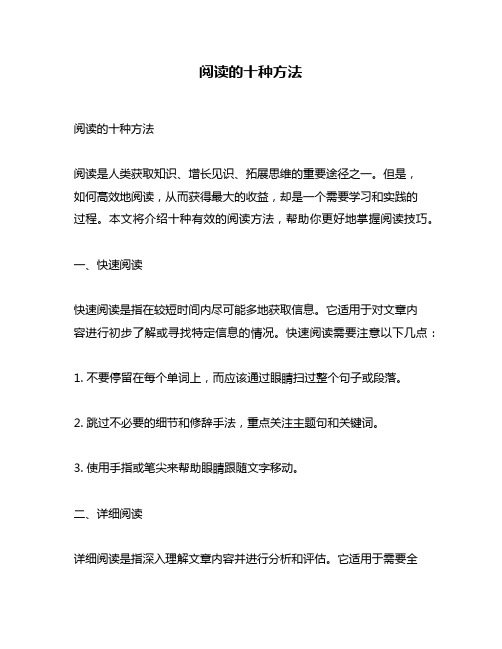
阅读的十种方法阅读的十种方法阅读是人类获取知识、增长见识、拓展思维的重要途径之一。
但是,如何高效地阅读,从而获得最大的收益,却是一个需要学习和实践的过程。
本文将介绍十种有效的阅读方法,帮助你更好地掌握阅读技巧。
一、快速阅读快速阅读是指在较短时间内尽可能多地获取信息。
它适用于对文章内容进行初步了解或寻找特定信息的情况。
快速阅读需要注意以下几点:1. 不要停留在每个单词上,而应该通过眼睛扫过整个句子或段落。
2. 跳过不必要的细节和修辞手法,重点关注主题句和关键词。
3. 使用手指或笔尖来帮助眼睛跟随文字移动。
二、详细阅读详细阅读是指深入理解文章内容并进行分析和评估。
它适用于需要全面了解文章主题和意图的情况。
详细阅读需要注意以下几点:1. 仔细阅读每个单词,并注意语言表达方式和修辞手法。
2. 理解文章结构和逻辑,分析作者的观点和立场。
3. 在阅读过程中做笔记,记录关键词、问题和自己的想法。
三、主题阅读主题阅读是指针对特定主题或领域进行深入阅读。
它适用于需要掌握某个领域知识或进行专业研究的情况。
主题阅读需要注意以下几点:1. 确定自己感兴趣的主题或需要掌握的领域。
2. 搜集相关的书籍、文章和资料,并对其进行分类整理。
3. 制定详细的阅读计划,包括时间安排和目标设定。
四、批判性阅读批判性阅读是指对文章内容进行深入思考并提出自己的观点和评价。
它适用于对某个问题或观点进行深入探讨的情况。
批判性阅读需要注意以下几点:1. 理解文章内容并分析作者的观点和立场。
2. 提出自己的问题和质疑,并寻找相关证据支持或反驳作者观点。
3. 对文章内容进行评价,并提出自己的看法和建议。
五、速记阅读速记阅读是指在阅读过程中进行速记和记录,以备后续查阅和复习。
它适用于需要快速掌握大量信息的情况。
速记阅读需要注意以下几点:1. 使用简洁的符号和缩写来记录关键词和信息。
2. 将笔记按照时间或主题进行分类整理。
3. 定期复习笔记,加深对文章内容的理解和记忆。
阅读有哪些好处
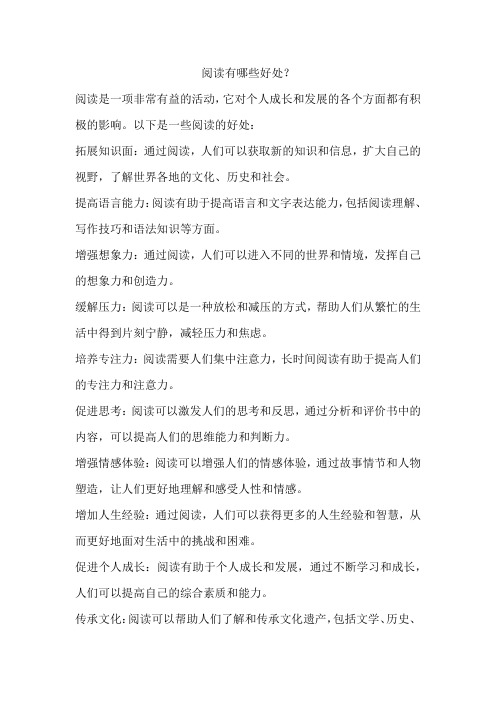
阅读有哪些好处?
阅读是一项非常有益的活动,它对个人成长和发展的各个方面都有积极的影响。
以下是一些阅读的好处:
拓展知识面:通过阅读,人们可以获取新的知识和信息,扩大自己的视野,了解世界各地的文化、历史和社会。
提高语言能力:阅读有助于提高语言和文字表达能力,包括阅读理解、写作技巧和语法知识等方面。
增强想象力:通过阅读,人们可以进入不同的世界和情境,发挥自己的想象力和创造力。
缓解压力:阅读可以是一种放松和减压的方式,帮助人们从繁忙的生活中得到片刻宁静,减轻压力和焦虑。
培养专注力:阅读需要人们集中注意力,长时间阅读有助于提高人们的专注力和注意力。
促进思考:阅读可以激发人们的思考和反思,通过分析和评价书中的内容,可以提高人们的思维能力和判断力。
增强情感体验:阅读可以增强人们的情感体验,通过故事情节和人物塑造,让人们更好地理解和感受人性和情感。
增加人生经验:通过阅读,人们可以获得更多的人生经验和智慧,从而更好地面对生活中的挑战和困难。
促进个人成长:阅读有助于个人成长和发展,通过不断学习和成长,人们可以提高自己的综合素质和能力。
传承文化:阅读可以帮助人们了解和传承文化遗产,包括文学、历史、
哲学等方面的知识。
总之,阅读是一项非常有益的活动,它可以对个人的知识、语言、想象力、思考、情感、经验等方面产生积极的影响。
读书的十种方法

读书的十种方法阅读是最基本的学习方法,也是最有效的获取知识的途径之一、然而,很多人并没有发掘出最适合自己的阅读方法,导致阅读效率低下。
下面是10种提高阅读效率的方法。
1.速读法速读法是一种快速获取信息的技巧,通过减少转换词汇到概念的时间,达到一个更快的读取速度。
速读的核心技巧是在大致领悟文章中的要点以后,快速地转换词汇为概念。
2.粗读法3.细读法细读法是一种更为深入、认真的阅读方式,需要更多的时间和精力。
细读法重点放在细节、注释和分析上,帮助读者深入了解文章的细节和背景信息。
4.反复阅读法反复阅读法是一种多次阅读同一篇文章的方法。
通过重复阅读,可以更好地理解文章,把握文章的结构和要点,以及加强记忆。
5.主动阅读法主动阅读法是一种在阅读的过程中积极思考的方法。
它包括提出问题、发表意见、寻找与自己有关的内容、找出生动的比喻等等,以帮助读者更好地理解文章。
6.联想法联想法是一种将已知的事物、概念与待学习的事物、概念相结合,以便于对待学习的概念或事物进行理解和记忆的方法。
这种方法可以通过创造与自己有关的故事、对话或形象的比喻等来实现。
7.笔记法笔记法是用来记录一个人对文本的思考、意见和感想的方法。
它可以帮助读者更好地理解文章,并思考自己的想法,文本的功能或相关的策略。
8.朗读法朗读法是一种将口头表达与视觉学习相结合的方法。
通过朗读文章可以帮助读者更好地理解文章,同时也可以提高与文本相关的口头交流技能。
9.交谈法交谈法是一种以集体讨论方式来加深对文章理解和分析的方法。
讨论可以帮助读者更好地分享和理解别人的观点,以及通过他人的意见和看法来推动自己的思考。
10.应用法应用法是一种将新学知识应用到实际生活中的方式。
这种方法可以通过将所学内容应用于日常生活、工作或学习中来帮助读者加深对所学知识的理解和记忆。
课外阅读30篇

阅读1 《好消息》三月的微风把好消息轻声告诉了一朵云,云儿背着许多小雨滴。
雨滴噼噼啪啪落下来,把好消息告诉了苹果树上的一朵花儿。
正在采蜜的小蜜蜂听到了好消息,就嗡嗡地唱着歌告诉山丘上的每一朵蒲公英。
蒲公英一句话也不说,她们金黄色的脸儿,在雨后的阳光下露出了笑容。
现在每一个人都知道了这个好消息—春天来了。
1、全文共有()个自然段。
2、在文中找出与下列词语意思相反的词哭—()坏—()去—()上—()3、短文中写了谁在传播那个好消息4、你知道这个好消息是什么吗写下来。
阅读2《小兔运南瓜》一天,住在森林边上的小白兔到菜地里收南瓜。
他蹦蹦跳跳地来到地里,看见南瓜长得又圆又大,高兴了,伸手就摘下来一个。
这一下他可发愁了,这么大的南瓜怎么搬得动呢正在这时,小熊猫骑着自行车过来了,边走边说:“小白兔,你好!”看见小熊猫骑的车子,小白兔一下子有主意了,他想:我的大南瓜圆圆的,多像车轮呀,不是也可以转动吗好,有办法啦!小白兔用力把南瓜竖起来,推着它往前走。
南瓜果然像车轮一样转动着向前滚去。
真是又快又省劲。
一会儿,小白兔就到了家门口。
兔妈妈见了惊讶的问:“你是怎么把南瓜运回来的”小白兔把经过告诉了妈妈,妈妈高兴地夸奖小白兔,说:“你真是个善于观察、爱动脑筋的好孩子。
”1、大南瓜圆圆的,多像呀。
小兔子地来到地里。
2、读了短文,你认为小兔聪明吗他是怎么把南瓜运回家的用“”画出文中的答案。
3、最后一个自然段共有句话。
兔妈妈是如何夸奖小兔的用“﹏﹏”在文中画出来。
阅读3《孤单的斑鸠》小斑鸠很孤单,几乎没有朋友。
有一天,他问白头翁:“白头翁爷爷,谁能和我交朋友呢”白头翁说:“你可以去和喜鹊交朋友,他热情、善良!”小斑鸠惭愧地说:“我强占过他的巢,他不会和我好的。
”白头翁说:“你可以去和啄木鸟交朋友,他勤劳、正直!”小斑鸠不好意思地说:“上次,我骂他是笨蛋,他不会原谅我的。
”白头翁想了想,又说:“那么,你去找小麻雀试试,他天真、活泼!”小斑鸠为难地说:“不行啊,前几天我和他打了一架,把他啄得头破血流。
简述阅读的类型
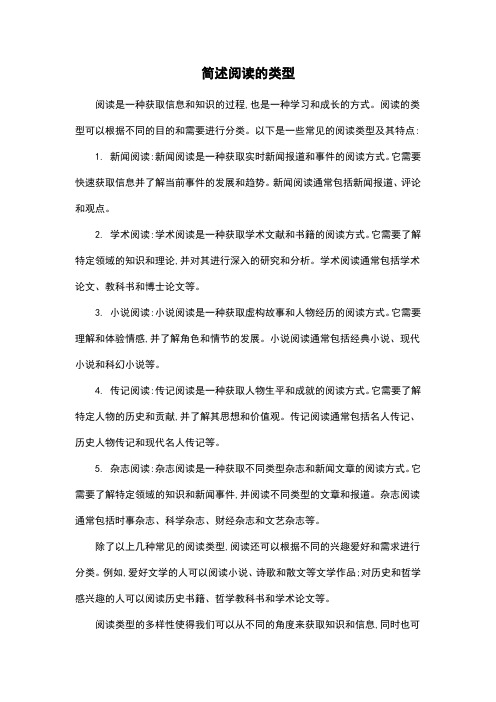
简述阅读的类型阅读是一种获取信息和知识的过程,也是一种学习和成长的方式。
阅读的类型可以根据不同的目的和需要进行分类。
以下是一些常见的阅读类型及其特点: 1. 新闻阅读:新闻阅读是一种获取实时新闻报道和事件的阅读方式。
它需要快速获取信息并了解当前事件的发展和趋势。
新闻阅读通常包括新闻报道、评论和观点。
2. 学术阅读:学术阅读是一种获取学术文献和书籍的阅读方式。
它需要了解特定领域的知识和理论,并对其进行深入的研究和分析。
学术阅读通常包括学术论文、教科书和博士论文等。
3. 小说阅读:小说阅读是一种获取虚构故事和人物经历的阅读方式。
它需要理解和体验情感,并了解角色和情节的发展。
小说阅读通常包括经典小说、现代小说和科幻小说等。
4. 传记阅读:传记阅读是一种获取人物生平和成就的阅读方式。
它需要了解特定人物的历史和贡献,并了解其思想和价值观。
传记阅读通常包括名人传记、历史人物传记和现代名人传记等。
5. 杂志阅读:杂志阅读是一种获取不同类型杂志和新闻文章的阅读方式。
它需要了解特定领域的知识和新闻事件,并阅读不同类型的文章和报道。
杂志阅读通常包括时事杂志、科学杂志、财经杂志和文艺杂志等。
除了以上几种常见的阅读类型,阅读还可以根据不同的兴趣爱好和需求进行分类。
例如,爱好文学的人可以阅读小说、诗歌和散文等文学作品;对历史和哲学感兴趣的人可以阅读历史书籍、哲学教科书和学术论文等。
阅读类型的多样性使得我们可以从不同的角度来获取知识和信息,同时也可以提高我们的阅读效率和阅读能力。
除了以上列举的阅读类型,还有许多其他类型的阅读,例如博客、新闻文章、百科全书、在线课程等,都是可以通过阅读获取知识和信息的。
课外阅读30篇
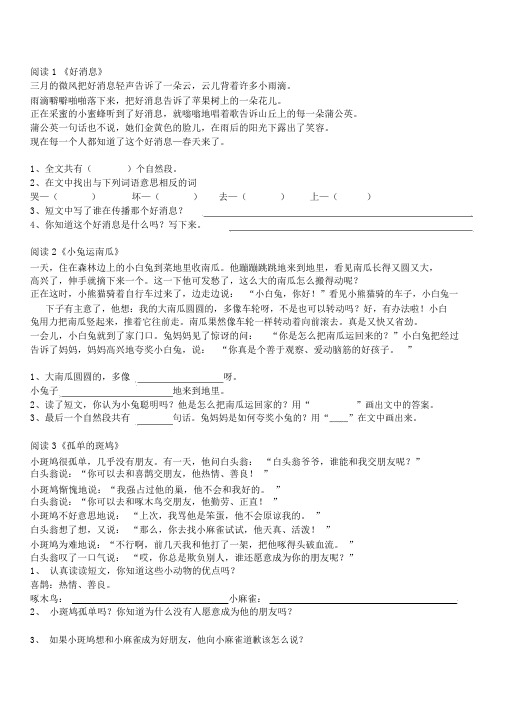
阅读 1 《好消息》三月的微风把好消息轻声告诉了一朵云,云儿背着许多小雨滴。
雨滴噼噼啪啪落下来,把好消息告诉了苹果树上的一朵花儿。
正在采蜜的小蜜蜂听到了好消息,就嗡嗡地唱着歌告诉山丘上的每一朵蒲公英。
蒲公英一句话也不说,她们金黄色的脸儿,在雨后的阳光下露出了笑容。
现在每一个人都知道了这个好消息—春天来了。
1、全文共有()个自然段。
2、在文中找出与下列词语意思相反的词哭—()坏—()去—()上—()3、短文中写了谁在传播那个好消息?4、你知道这个好消息是什么吗?写下来。
阅读 2《小兔运南瓜》一天,住在森林边上的小白兔到菜地里收南瓜。
他蹦蹦跳跳地来到地里,看见南瓜长得又圆又大,高兴了,伸手就摘下来一个。
这一下他可发愁了,这么大的南瓜怎么搬得动呢?正在这时,小熊猫骑着自行车过来了,边走边说:“小白兔,你好!”看见小熊猫骑的车子,小白兔一下子有主意了,他想:我的大南瓜圆圆的,多像车轮呀,不是也可以转动吗?好,有办法啦!小白兔用力把南瓜竖起来,推着它往前走。
南瓜果然像车轮一样转动着向前滚去。
真是又快又省劲。
一会儿,小白兔就到了家门口。
兔妈妈见了惊讶的问:“你是怎么把南瓜运回来的?”小白兔把经过告诉了妈妈,妈妈高兴地夸奖小白兔,说:“你真是个善于观察、爱动脑筋的好孩子。
”1、大南瓜圆圆的,多像呀。
小兔子地来到地里。
2、读了短文,你认为小兔聪明吗?他是怎么把南瓜运回家的?用“”画出文中的答案。
3、最后一个自然段共有句话。
兔妈妈是如何夸奖小兔的?用“﹏﹏”在文中画出来。
阅读 3《孤单的斑鸠》小斑鸠很孤单,几乎没有朋友。
有一天,他问白头翁:“白头翁爷爷,谁能和我交朋友呢?”白头翁说:“你可以去和喜鹊交朋友,他热情、善良!”小斑鸠惭愧地说:“我强占过他的巢,他不会和我好的。
”白头翁说:“你可以去和啄木鸟交朋友,他勤劳、正直!”小斑鸠不好意思地说:“上次,我骂他是笨蛋,他不会原谅我的。
”白头翁想了想,又说:“那么,你去找小麻雀试试,他天真、活泼!”小斑鸠为难地说:“不行啊,前几天我和他打了一架,把他啄得头破血流。
阅读的六种方式
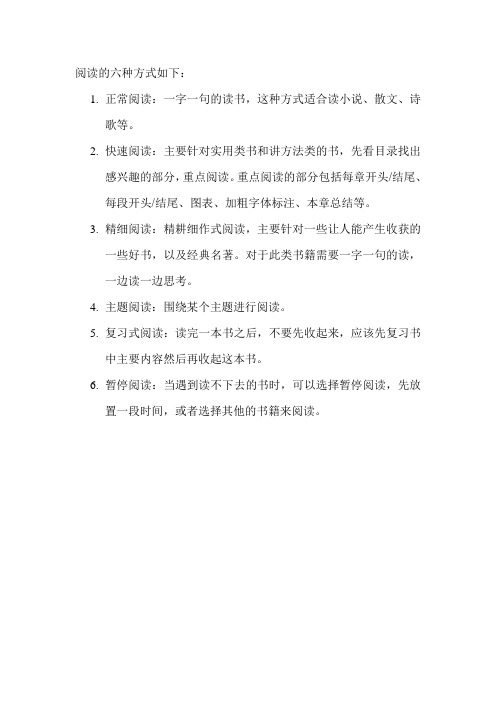
阅读的六种方式如下:
1.正常阅读:一字一句的读书,这种方式适合读小说、散文、诗
歌等。
2.快速阅读:主要针对实用类书和讲方法类的书,先看目录找出
感兴趣的部分,重点阅读。
重点阅读的部分包括每章开头/结尾、每段开头/结尾、图表、加粗字体标注、本章总结等。
3.精细阅读:精耕细作式阅读,主要针对一些让人能产生收获的
一些好书,以及经典名著。
对于此类书籍需要一字一句的读,
一边读一边思考。
4.主题阅读:围绕某个主题进行阅读。
5.复习式阅读:读完一本书之后,不要先收起来,应该先复习书
中主要内容然后再收起这本书。
6.暂停阅读:当遇到读不下去的书时,可以选择暂停阅读,先放
置一段时间,或者选择其他的书籍来阅读。
- 1、下载文档前请自行甄别文档内容的完整性,平台不提供额外的编辑、内容补充、找答案等附加服务。
- 2、"仅部分预览"的文档,不可在线预览部分如存在完整性等问题,可反馈申请退款(可完整预览的文档不适用该条件!)。
- 3、如文档侵犯您的权益,请联系客服反馈,我们会尽快为您处理(人工客服工作时间:9:00-18:30)。
SPEED READING A (1)Reading ComprehensionPassage 1Researchers have established that when people are mentally engaged, biochemical changes occur in th e brain that allow it to act more effectively in cognitive areas such as attention and memory. This is true regardless of age.People will be alert and receptive if they are faced with information that gets them to think about things they are interested in. And someone with a history of doing more rather than less will go into old age more cognitively sound than someone who has not had an active mind.Many experts are so convinced of th e benefits of challenging the brain t hat they are putting the theory to work in their own lives. “The idea is no t necessarily to learn to memorize enormous amounts of inf ormation,” says James Fozard, associate director of the National Institute on Aging. “Most of us don’t need that kind of skill. Such specific training is of less inter est than being able to maintain mental alertness.” Fozard and others say they challenge their brains with different mental skill, both because they enjoy them and because they are sure that their range of activities will help the way their brains work.Gene Cohen, acting director of the same institute, suggests that people in their old age should engage in menta l and physical a ctivities individually as well as in groups. Cohen says that we are frequently advised to keep physically active as we age, but older people need to keep mentally active as well. Those who do are more likely to maintain their intellectual abilities and to be generally happier and better adjusted. “The point is, you need to doh,” Cohen says, “Intellectual activity actually influences brain-cell health and size.”1.People who are cognitively healthy are those ______.a.w ho can remember large amounts of informationb.w ho are highly intelligentc.w hose min ds are alert and receptived.w ho are good at recognizing different sounds2.According to Fozard’s argument people can make their brains work more effectively by______.a.c onstantly doing memory workb.t aking part in various mental activitiesc.g oing through specific trainingd.m aking frequent adjustments3.The findings of James and other scientists in their work ______.a.r emain a theory to be further provedb.h ave been challenged by many other expertsc.h ave been generally acceptedd.a re practised by the researchers themselves4.Older people are generally advised to ________.a.k eep fit by going i n for physical activities as fit as a fiddle;b.k eep mentally active by challenging their brainsc.m aintain mental alertness through specific trainingd.m aintain a balance between individual and group activities5.What is the passage mainly about?a.H ow biochemical changes occur in the human brain.b.W hy people should keep active not only physically but also mentally.c.H ow intellectual activities influence brain-cell health.d.W hy people should receive special mental training as they age.Passage 2Attention t o detail is something everyone can and should do- especially in a tight job market. Bob Crossley, a human-resources expert notices this in the job applications that come across his desk every day. “It’s amazing how many candidates eli minate themselv es.” He says.“Resumes arrive with stains. Some candidates don’t bother to spell the company’s name correctly. Once I s ee a mistake, I eliminate the candidate,” Crossley concludes. “if they cannot take care of these details. Why should we trust them with a job?”Can we pay too much attention to details? Absolutely. Perfectionists struggle over little things at the cost of something larger than they work toward. “To keep from losing the forest for the trees”, says Charles Carfield, associate professor at the University of California, San Francisco, “We must constantly ask ourselves how the details we’re working on fit i nto the larger picture. If they don’t, we should drop them and move to something else.”Garfield compares this process to his work as a computer scientist at NASA. “The Apollo II moon launch was slightly off-course 90 percent of the time,” says Carfield, “But a successful landing was still likely because we knew the exact coordinates of our goal. This allowed us to make adjustments as necessary.” Knowing where we want to go helps us judge the importance of every task we undertake.Too often we believe what accounts for others’ success is some special secret or a lucky break. But rarely is success so mysterious. Again and again, we see that by doing l ittle things w ithin our grasp well, large rewards follow.6.According to the passage, some job applicants were rejected _______.a.b ecause of their c arelessness as shown in their failure to present a clean copy of aresumeb.b ecause of their inadequate education as shown in their poor spelling in writing a resumec.b ecause they failed to give a detailed description of their background in theirapplicationsd.b ecause they eliminated their names form the applicants’ list themselves7.The word “perfectionists” (Line 1, Para. 3) refers to those who _____.a.d emand others to get everything absolutely rightb.k now how to adjust their goals according to the circumstancesc.p ay too much attention to details only to lose their major objectivesd.a re capable of achieving perfect results in whatever they do8.Which of the following is the author’s advice to the reader?a.A lt hough to o much attention to details may be costly, they should not be overlooked.b.D on’t forget details when drawing pictures..c.B e aware of the importance of a task before undertaking it.d.C areless applicants are not to be trusted.9.The example of the Apollo II moon launch is given to illustrate that ______.a.minor mistake can be ignored in achieving major objectivesb.failure is the mother of successc.adjustments are the key to the successful completion of any workd.keeping one’s goal in mind helps in deciding which details can be overlooked10.The best title for this passage would be _____.a.D on’t Be a Perfectionistb.I mportance of Adjustmentsc.D etails and Major Objectivesd.H ard Work Plus Good LuckPassage 3Britain almost more than any other countr y in the world must seriously face the problem of building upwards, that is to say of accommodating a considerable proportion of its population in high blocks of flats. It is said that the Englishma n objects to this type of existence, but if the case is such, he does in fact differ from the inhabitants of most countries of the world today.In the pas t our own blocks of flats have been associated with th e lower-income groups and they have lacked the obvious provisions, such as central heating, constant hot water supply, electrically operated lifts from top to bottom, and so on, as well as such details, important notwithstanding, as easy facilities for disposal of dust and rubbish and storage places for baby carriages on the ground floor, playgrounds for children on the top of the buildings, and drying grounds for washing. It is likely that the dispute regarding flats versus individual houses will continue to r ag e on for a long time as far as Britain is concerned. And it is unfortunate that there should be hot feeling on both sides whenever this subject is raised. Those who oppose the building of flats base their case primarily on the assumption that everyone prefers an individual home and gardenand on the high cost per unit of accommodation. The latter ignores the higher cost of pr oviding full services to a scattered community and the cost in bot h money and time of the journeys to work for the suburban resident.11.We can infer from the passage that ______.a.E nglish people, like most people in other countries, dislike living in flatsb.p eople in most c ountries of the world today are not opposed to living in flats.c.p eople in Britain are forced to move into high blocks of flatsd.m odern flats still fail to provide the necessary facilities for living12.What is said about blocks of flats built in the past in Britain?a.T hey were mostly inhabited by people who did not earn much.b.T hey were usually not large enough to accommodate big families.c.T hey were sold to people before necessary facilities were installed.d.T hey provided playgrounds for children on the top of the buildings.13.The word “rage” (in the fourth sentence) means “_______”.a. be ignoredb. develop with great forcec. encourage people greatlyd. be in fashion14.Some people oppose the building of flats because ______.a.t he living expenses for each individual family are higherb.i t involves higher cost compared with the building of housesc.t hey beli eve people like to live in houses with gardensd.t he disposal of rubbish remains a problem for those living in flats15.The author mentions that people who live in suburban houses ______.a.d o not have access to easy facilities because they live away from the cityb.h ave to pay a lot of money to employ people to do service workc.t ake longer time to know each other because they are a scattered communityd.h ave to spend more money and time travelling to work every dayPassage 4Where do pesticides fit into the picture of environmental disease? We have seen that they now pollute soil, water, and food, that they have the power to make our streams fishless and our gardens and woodlands silent and birdless. Man, however much he may like to pretend the contrary, is part of nature. Can he escape a pollution that is now so thoroughly distributed throughout our world?We know that even single exposures to these chemicals, if the amount is large enough, can cause extremely severe poisoning. But this is not the major problem. The sudden illness or death of farmers, farm workers, and others exposed to sufficient quantities of pesticides are very sad and should not occur. For the population as a whole, we must be more concerned with the delayed effects of absorbing small amounts of the pesticides that invisibly pollute our world.Responsible public health officials have pointed out that the biological effects of chemicals are cumulative over long periods of time, and that the danger to the individual may depend on the sum of the exposures received throughout his lifetim e. For these very reasons t he danger is easily ignored. It is human nature to shake off what may seem to us a threat of future disast er. “Men are naturally most impressed by diseases which have obvious signs”, says a wise physician, Dr Rene Dubos, “yet some of their worst enemies slowly approach them u nnoticed.”16.Which of the following is closest in meaning to the senten ce “Man…is part of nature.”(, Para. 1)?a.M an appears indifferent to what happens in nature.b.M an acts a s if he does not belong to nature.c.M an can avoid the effects of environmental pollution.d.M an can escape his responsibilities for environmental protection.17.What is the author’s attitude towards the environmental effects of pesticides?a. Pessimisticb. Indifferentc. Defensived. Concern ed18.In the author’s view, the sudden death caused by exposure to large amounts of pesticides_______.a.is not the worst of the negative consequences resulting from the use of pesticidesb.now occurs most frequently among all accidental deathsc.has sharply increased so as to become the center of public attentiond.is unavoidable because people can’t do without pesticides in farming19.People tend to ignore the delayed effects of exposure to chemicals because _______.a.limited exposure to them does little harm to people’s healthb.the present is more important for them than the futurec.the danger does not become apparent immediatelyd.humans are capable of withstanding small amounts of poisoning20.It can be concluded from Dr. Dubos’ remarks that _______.a.p eople find invisible diseases difficult to deal withb.a ttacks by hidden enemies tend to be fatalc.d iseases with obvious signs are easy to cured.p eople tend to o verlook hidden dangers caused by pesticidesSPEED READING A (2)Reading ComprehensionPassage 1Space is a dangerous place, not only because of meteors but also because of rays from the sun and other stars. The atmosphere again acts as our protective blanket on earth. Light get through, and this is essential for plants to make the food which we eat. Heat, too, makes our environment endurable. Various kinds of rays come through the air from outer space, but enormous quantities of radiation from the sun are screened off. As soon as menleave the atmosphere they are exposed to this radiation but their spacesuits or the walls of their spacecraft, if they are inside, do prevent a lot of radiation damage.Radiation is the greatest known danger to explorers in space. The unit of radiation is called “rem”. Scientists have reason to think that a man can put up with far more radiation than 0.1 rem without being damaged; the figure of 60 rems has been agreed on. The trouble i s that it is extremely difficult t o be sure about radiation damage—a person may feel perfectly well, but the cells of his or her sex organs may be damaged, and this will not be discovered un til the birth of deformed children or even grandchildren. Missions of the Apollo flights have had to cross belts of high radiation and, during the outward and return journeys, the Apollo crew accumulated a large amounts of rems. So far, no dangerous amount of radiation have been reported, but the Apollo missions have been quite short. We simply do not know yet how men are going to get on when they spend weeks and months outside the protection of the atmosphere, working in a space laboratory. Drugs might help to decrease the damage done by radiation, but no really effective ones have been found so far.1.According to the first paragraph, the atmosphere is essential to man in that _____.a.it protects him against the harmful rays from spaceb.it provides sufficient light for plant growthc.it supplies the heat necessary for human survivald.it screens off the falling meteors2.We know from the passage that _____.a.e xposure to even tiny amounts of radiation is fatalb.t he effect of exposure to radiation is slow in comingc.r adiation is avoidable in space explorationd.a stronauts in spacesuits needn’t worry abou t radiation damage3.The harm radiation has done to the Apollo crew member ______.a. is insignificantb. seems overestimatedc. is enormousd. remains unknown4.It can be inferred from the passage that ______.a.t he Apollo mission was very successfulb.p rotection from space radiation is no easy jobc.a stronauts will have deformed children or grandchildrend.r adiation is not a threat to well-protected space explorers5.The best title for this passage would be ______.a.T he Atmosphere and Our Environmentb.R esearch on Radiationc.E ffects of Space Radiationd.I mportance of Protection Against RadiationPassage 2Taste is such a subjective matter that we don’t usually conduct preference te sts for food. The most you can say about anyone’s preference, is that it’s one person’s opinion. But because the two big cola companies Coca-Cola and Pepsi Cola are marketed so aggressively, we’ve wondere d how big a role taste preference actually plays in brand loyalty. We set up a taste test that challenged people who identified themselves as either Coca-Cola or Pepsi fans: Find your brand in a blind tasting.We invited staff volunteers who had a strong liking for either Coca-Cola classic or Pepsi, Diet Coke, or Diet Pepsi. These were people who thought they’d have no trouble telling their brand from the other brand.We eventually located 19 regular cola drinkers and 27 diet Cola drinkers. Then we fed them four unidentified samples of cola one at a time, regular colas for the one group, diet versions for the other. We asked them to tell us whether each sample was Coke or Pepsi; then we analyzed the records statistically to compare the participants’ choices with what mere guess-work could have accomplished.Getting all four samples right was a tough test, but not too tough, we thought, for people who believed they could recognize their brand. In the end, only 7 out of 19 regular cola drinkers correctly identified their brand of choice in all four trials. The diet-cola drinkers did a little worse-only 7 of 27 ide ntified all four samples correctly.While both groups did better than chance would predict, nearly half the participants in each group made the wrong choice two or more times. Two people got all four samples wrong. Overall, half the participants did about as well on the last round of tasting as on the first, so fatigue, or taste burnout, was not a factor. Our preference test results suggest that only a few Pepsi participants and Coke fans may really be able to tell their favorite brand by taste and price.6.According to the passage the preference test was conducted in order to ______.a.f ind out the role taste preference plays in a person’s drinkingb.r eveal which cola is more to the liking of the drinkersc.s how that a person’s opinion about taste is mere guess-workd.c ompare the ability of the participants in choosing their drinks7.The statistics recorded in the preference tests show _____.a.C oca-Cola and Pepsi are people’s two most favorite drinksb.t here is not much difference in taste between Coca-Cola and Pepsic.f ew people had trouble telling Coca-Cola from Pepsid.p eople’s tastes differ from one another8.It is implied in the first paragraph that _______.a.t he purpose of taste tests is to promote the sale of colasb.t he improvement of quality is the chief concern of the two cola companiesc.t he competition between the two colas is very strong.d.B lind tasting is necessary for identifying fans9.The word “burnout” (in the second sentence from the end, Para. 5) here refers to thestate of ______.a.b eing seriously burnt in the skinb.b eing unable to burn for lack of fuelc.b eing badly damaged by fired.b eing unable to function because of excessive use10.The author’s purpose in writing this passage is to ______.a.s how that taste preference is highly subjectiveb.a rgue that taste testing is an important marketing strategyc.e mphasize that taste and price are closely related to each otherd.r ecommend that blind tasting be introduced in the quality control of colasPassage 3The concept of “environment” is certainly difficult and may even be misunderstood; but we have no handy substitute. It seems simple enough to distinguish between the organism and the surrounding environment and to separate forces acting on an organism into those that are internal and biological and those that are external and environmental. But in actual practice this system breaks down in many ways, because the organism and the environment are constantly interacting so that the environment is modified by the organism and vice versa.I n the case of man, the difficulties with the environmental concept are even more complicated b ecaus e we have to deal with man as an animal and with man as a bearer of culture. If we look at man as an animal and try to analyze the environmental forces that are acting on the organism, we find that we have to deal with things like climate, soil, plants, and such-like factors common to all biological situational but we also find, always, very important environmental influences that we can only class as “cultural”, which modify the physical and biological factors. But man, as we know him, is always a bearer of culture; and, if we study human culture, we find that it, in turn, is modifie d by the environmental factors of climate and geography. We thus easily get into great difficulties from the necessity of viewing culture, at one moment, as a part of the man and, at another moment, as a part of the environment.11.Which of the following words can best describe the popular understanding of“environment” as the author sees it?a. Elaborateb. Prejudicedc. Faultlessd. Oversimplified12.According to the author the concept of “environment” is difficult to explain because______.a.it doesn’t distinguish between the organism and the environmentb.it involves both internal and external forcesc.the orga nism and the environment influence each otherd.the relationship between the organism and the environment is unclear13.In analyzing the environmental forces acting on man the author suggests that _____.a.b iological factors are less important to the organism than cultural factors to manb.m an and other animals are modified equally by the environ-mental forcesc.m an is modified by the cultural environment as well as by the natural environmentd.p hysical and biological factors exert more influence on other organisms than on man14.As for culture, the author points out that ______.a.it develops side by side with environmental factorsb.i t is a lso affected by environmental factorsc.it is generally accepted to be part of the environmentd.it is a product of man’s biological instincts15.In this passage, the author is primarily concerned with ______.a.t he inte rpretation of the term “environment”b.t he discussion on organisms and biological environmentc.t he comparison between internal and external factors influencing mand.t he evaluation of man’s influence on culturePassage 4The speaker, a teacher from a community college, addressed a sympathetic audience. Heads nodded in agreement when he said,“High school English teachers are not doing their jobs.” He described the inadequacies of his students, all high school graduates who can use language only at a grade 9 level. I was unable to determine from his answers to my questions how this grade 9 level had been established.My topic i s neither standards nor its decline. What the speaker was really saying is that he is no longer young; he has been teaching for sixteen years, and is able to think and speak like a mature adult.My point is that the frequent complaint of one generation about the one immediately following it is inevitable. It is al so human nature to lo ok for the reasons for our dissatisfaction. Before English became a school subject in the late nineteenth century, it was difficult to find the target of the blame for language deficiency. But since then, English teachers have been un der constant attack.The complainers think they have hit upon an original idea. As their own command of the language improves, they notice that young people do not have this same ability.Unaware that their own ability has developed through the years, t hey assume the new generation of young people must be hopeless in this respect. To the eyes and ears of sensitive adults the language of the young always seems inadequate.Since this concern about the decline and fall of the English language is not perceived as a generational phenomenon but rather as something new and peculiar to today’s young people, it naturally follows that today’s English teachers cannot be doing their jobs, otherwise, young people would not commit offenses against the language.16.The speaker the author mentioned in the passage believed that _______.a.t he language of the younger generation is usually inferior to that of the older generationb.t he students had a poor command of English because they didn’t work hard enoughc.h e was an excellent language teacher because he had been teaching English for sixteenyearsd.E nglish teachers should be held responsible for the students’ poor command of English17.In the author’s opinion, the speaker ______.a.g ave a correct judgment of the English level of the studentsb.h ad exaggerated the language problems of the studentsc.w as right in saying that English teachers were not doing their jobsd.c ould think and speak intelligently18.The author’s attitude towards the speaker’s remarks is ______.a. neutralb. positivec. criticald. compromising19.It can be concluded from the passage that ______.a.it is justifiable to include English as a school subjectb.the author disagrees with the speaker over the standard of English at Grade 9 levelc.English language teaching is by no means an easy jobnguage improvement needs time and effort20.In the passage the author argues that ______.a.it is unfair to blame the English teachers for the language deficiencies of the studentsb.young people would not commit offences against the language if the teachers did theirjobs properlyc.to eliminate language deficiencies one must have sensitive eyes and earsd.to improve the standard of English requires the effort of several generationsSPEED READING A 3Passage 1Exchange a glance with someone, then look away. Do you realize that you have made a statement? Hold the glance for a second longer, and you have made a different statement. Hold it for 3 seconds, and the meaning has changed again. For every social situation, there is a permissible time that you can hold a person’s gaze witho ut being intimate, rude, or aggressive. If you are on an elevator, what gaze-time are you permitted? To answer this question, consider what you typically do. You very likely give other passengers a quick glance to size them up and to assure them that you mean no threat. Since being close to another person signals the possibility of interaction, you need to emit a signal telling others you want to be left alone. So you cut off eye contact, what sociologist Erving Goffman (1963) calls “a dimming of the lights”. You l ook down at the floor, at the indicator lights, anywhere but into another passenger’s eyes. Should you break the rule against staring at a stranger on an elevator? You will make the other person exceedingly uncomfortable, and you are likely to feel a bit strange yourself.If you hold eye contact for more than 3 seconds, what are you telling another person? Much depends on the person and the situation. For instance, a man and a woman communicate interest in this manner. They typically gaze at each other for about 3 seconds at a time, then drop their eyes down for 3 seconds, before letting their eyes meet again. But if one man gives another man a 3-second-plus stare, he signals “I know you,” “I am interested in you,” or “You look peculiar and I am curious about you.” This type of stare often produces hostile feelings.1.It can be inferred from the first paragraph that ______.a.e very glance has its significanceb.s taring at a person is an expression of interestc.a gaze longer than 3 seconds is unacceptabled.a glance conveys more meaning than words2.If you want to be left alone on an elevator, the best thing to do is _____.a.t o look into another passenger’s eyesb.t o av oid eye contact with other passengersc.t o signal you are not a threat to anyoned.t o keep a distance from other passengers3.By “a dimming of the lights” (Para. 1) Erving Coffman means “____.”a. closing one’s eyesb. turning off the lightsc. ceas ing to glance at othersd. reducing gaze-time to the minimum4.If one is looked at by a stranger for too long, he tends to feel _____.a. depressedb. uneasyc. curiousd. amused5.The passage mainly discusses ______.a.t he limitations of eye contactb.t he exchange of ideas through eye contactc.p roper behavior in different situationsd.t he role of eye contact in interpersonal communicationPassage 2The picnics, speeches, and parades of today’s Labor Day were all part of the first celebration, held in New York City in 1882. It s promoter was an Irish-American l abor leader named Peter J. McGuire. A carpenter by trade, McGuire had worked since the age of eleven, and in 1882 was president of the United Brotherhood of Carpenters and Joiners (UBCJ). Approaching the City’s Central Labor Union that summer, he proposed a holiday that would applaud “the industr ial spirit –the great vital force of every nation”. On September 5 his suggestion born fruit, as an estimated 10,000 workers, many of them ignoring their bosses’ warnings,left work to march from Union Square up Fifth Avenue to 42nd Street. The event gained national attention, and by 1893 thirty states had made Labor Day an annual。
